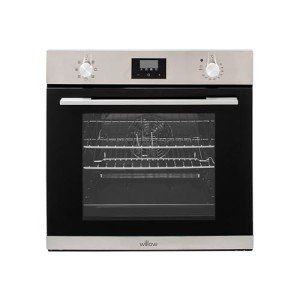The Top Reasons Why People Succeed In The Integrated Electric Oven Industry

The Rise of Integrated Electric Ovens: A Comprehensive Guide
Integrated electric ovens are ending up being increasingly popular in modern-day cooking areas due to their smooth design, energy efficiency, and advanced cooking features. Created to mix flawlessly with kitchen cabinets, these appliances not only improve aesthetics but likewise offer a series of functionalities that cater to the cooking requirements of modern homes. hob and built in oven package will look into the advantages of integrated electric ovens, how they compare to traditional ovens, and essential elements to consider when acquiring one.
What is an Integrated Electric Oven?
An integrated electric oven is created to be built into kitchen cabinets, offering a structured appearance that maximizes space efficiency. Unlike freestanding ovens, integrated designs typically include a flush fit with cabinetry and come with designs that can match or complement the surrounding kitchen decor. These ovens typically include a large selection of functionalities, including convection cooking, self-cleaning choices, and smart technology functions.
Advantages of Integrated Electric Ovens
The appeal of integrated electric ovens lies in their various advantages. Below are some of the crucial advantages:
Aesthetic Appeal
- Integrated ovens use a tidy and contemporary appearance.
- They can be customized to match the kitchen's cabinetry and style theme.
Space Efficiency
- Developed to optimize the readily available kitchen area.
- Ideal for smaller sized cooking areas where freestanding models may be troublesome.
Advanced Cooking Features
- Many models consist of features such as convection heat, steam cooking, and several cooking modes.
- Smart ovens can even link to Wi-Fi for remote monitoring and control.
Energy Efficiency
- Electric ovens frequently supply more constant heating and faster cooking times compared to gas ovens.
- Newer models are created with energy-saving innovations, which can help in reducing energy expenses.
Improved Safety
- Integrated ovens typically include features such as car shut-off and child lock functions for included security.
Table 1: Comparison of Integrated Electric Ovens and Traditional Ovens
| Feature | Integrated Electric Oven | Standard Oven |
|---|---|---|
| Design | Built-in, flush-fitting | Freestanding, takes up more space |
| Cooking Efficiency | Normally quicker, more even warming | Varies, typically longer warm up |
| Aesthetic Integration | Seamless with cabinets | Standout home appliance |
| Space Usage | Space-saving | Requires more flooring area |
| Advanced Features | Typically consists of smart innovations | Limited technological combination |
| Energy Efficiency | Typically more energy-efficient | Can differ by model |
Secret Features to Look For in Integrated Electric Ovens
When searching for an integrated electric oven, numerous functions need to be taken into consideration to ensure you pick a design that fits your cooking style and preferences. Here are some essential functions to think about:
Size and Capacity
- Search for ovens that fit within your kitchen cabinets and evaluate internal capacity based upon your cooking needs.
Cooking Modes
- Think about designs that provide multiple cooking functions consisting of bake, broil, steam, and convection to broaden cooking possibilities.
Self-Cleaning Options
- Self-cleaning modes conserve effort and time in preserving the oven.
Control Options
- Touchscreen controls or wise tech combination for remote gain access to can include convenience to cooking.
Energy Rating
- Pick energy-efficient designs with great ratings to ensure lower operating expenses.
Service warranty and Support
- Check for service warranties to cover repairs and replacements and the schedule of customer care.
FAQs
Q1: What makes integrated electric ovens various from built-in ovens?
A1: Integrated electric ovens are particularly designed to mix into cabinetry, using a smooth aesthetic, while built-in ovens may not always have the same flush design and frequently stand out more as individual appliances.
Q2: Are integrated electric ovens more pricey than standard ovens?
A2: Generally, integrated electric ovens can be more expensive due to their design and advanced functions. However, the long-lasting energy savings and improved performance typically offset the preliminary cost.
Q3: How do I ensure correct setup of an integrated electric oven?
A3: It is recommended to hire a professional for setup, as integrated ovens require precise measurements and can include electrical connections that need to adhere to local building regulations.
Q4: Can I tailor the appearance of my integrated electric oven?
A4: Yes, numerous makers offer customizable panels or finishes to match your kitchen cabinetry, permitting for a completely integrated appearance.
Q5: What maintenance does an integrated electric oven usually require?
A5: Regular cleaning, specifically after heavy usage, and examining seals and vents for wear are advised to keep the oven's performance and look.
In conclusion, integrated electric ovens are a useful and trendy addition to contemporary kitchens. Their benefits include visual appeal, energy efficiency, and advanced cooking functions, making them a popular option for home cooks. Understanding the key characteristics and comparing different designs can help consumers make informed getting choices and select an integrated oven that best suits their culinary needs and kitchen design. With their seamless combination and technological developments, these ovens are poised to end up being staples in the kitchen for several years to come.

